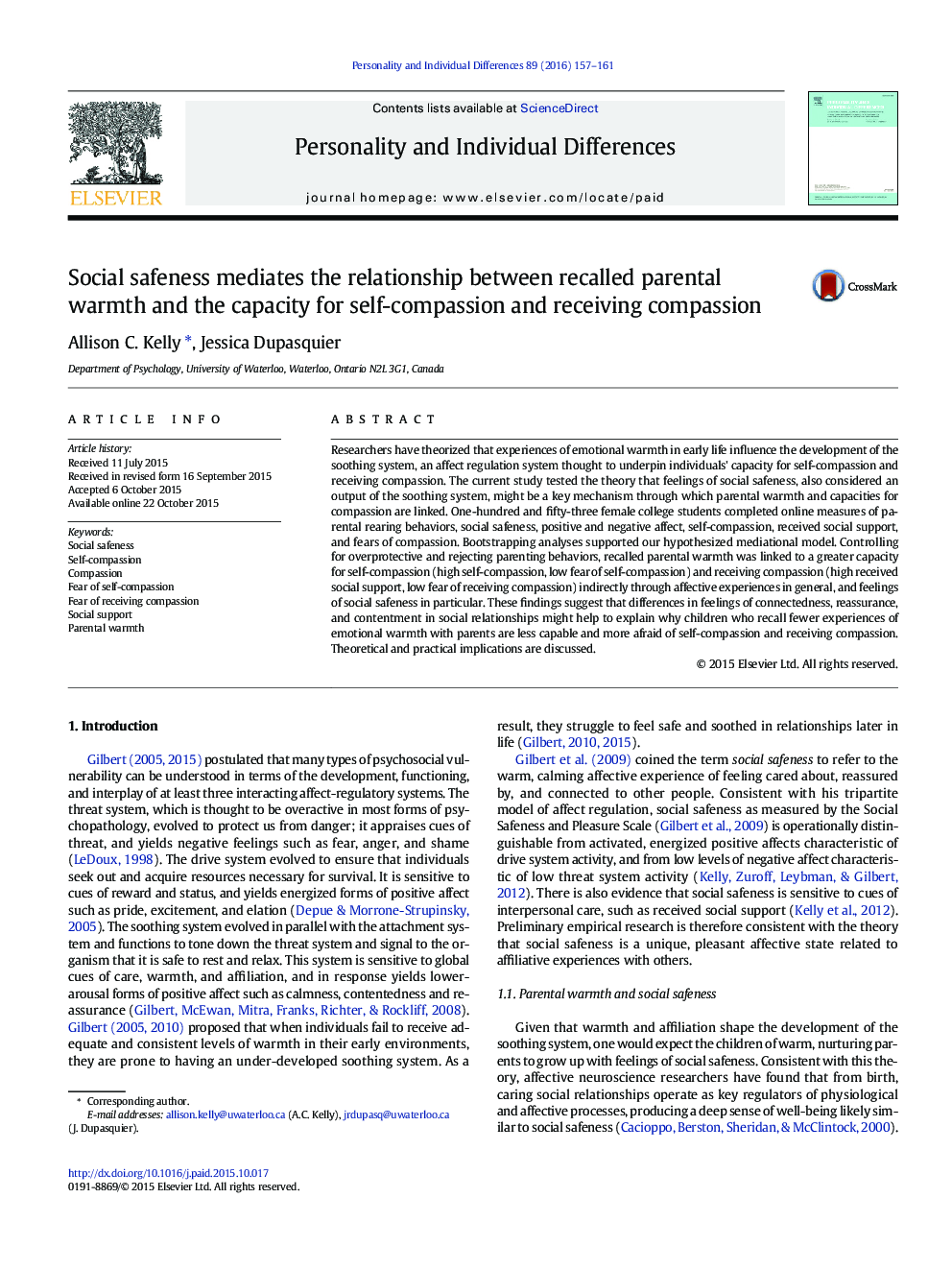| کد مقاله | کد نشریه | سال انتشار | مقاله انگلیسی | نسخه تمام متن |
|---|---|---|---|---|
| 7250765 | 1472029 | 2016 | 5 صفحه PDF | دانلود رایگان |
عنوان انگلیسی مقاله ISI
Social safeness mediates the relationship between recalled parental warmth and the capacity for self-compassion and receiving compassion
ترجمه فارسی عنوان
امنیت اجتماعی میان ارتباطات بین گرمای پدر و مادر بازدارنده و ظرفیت خودخواهی و اخذ شفقت
دانلود مقاله + سفارش ترجمه
دانلود مقاله ISI انگلیسی
رایگان برای ایرانیان
کلمات کلیدی
امنیت اجتماعی، خودخواهی، رحم و شفقت - دلسوزی، ترس از خودخواهی، ترس از دریافت شفقت، حمایت اجتماعی، گرمای والدین،
ترجمه چکیده
محققان بر این باورند که تجربیات گرمایی عاطفی در اوایل زندگی، بر توسعه سیستم تسکین دهنده تأثیر می گذارد و سیستم تنظیم مقابله با آن تأثیر می گذارد تا ظرفیت افراد برای خودکفایی و دریافت شفقت را تقویت کند. مطالعه حاضر این نظریه را تضمین کرد که احساس امنیت اجتماعی، همچنین به عنوان خروجی سیستم تسکین دهنده محسوب می شود، ممکن است یک مکانیزم کلیدی باشد که از طریق آن گرمای والدین و توانایی های همدردی مرتبط می شود. 150 پنجم دانشجویان زن، اقدامات آنلاین رفتارهای پرورش والدین، امنیت اجتماعی، تأثیر مثبت و منفی، خودکفایی، حمایت اجتماعی و ترس از شفقت را تکمیل کردند. تجزیه و تحلیل بوت استرپپینگ از مدل مداخله فرضیه ما پشتیبانی می کند. کنترل بر رفتارهای والدین بیش از حد محافظت و رد کردن، گرایش به والدین به یاد می آورد که به طور غیرمستقیم با ظرفیت بیشتر برای خودکفایی (خودکفایی بالا، ترس پایین از خودکفایی) و دریافت شفقت (حمایت اجتماعی بالا دریافت، ترس پایین از دریافت شفقت) از طریق تجربیات عاطفی به طور کلی و احساس امنیت اجتماعی به طور خاص. این یافته ها نشان می دهد که تفاوت در احساسات متقابل، اطمینان و رضایت در روابط اجتماعی می تواند به توضیح اینکه چرا کودکانی که تجربه های کمتری از گرایش احساسی را به یاد می آورند با والدین کم توانا و ترس بیشتری از خودکوشی و رضایت شغلی دارند. مفاهیم نظری و عملی بحث شده است.
موضوعات مرتبط
علوم زیستی و بیوفناوری
علم عصب شناسی
علوم اعصاب رفتاری
چکیده انگلیسی
Researchers have theorized that experiences of emotional warmth in early life influence the development of the soothing system, an affect regulation system thought to underpin individuals' capacity for self-compassion and receiving compassion. The current study tested the theory that feelings of social safeness, also considered an output of the soothing system, might be a key mechanism through which parental warmth and capacities for compassion are linked. One-hundred and fifty-three female college students completed online measures of parental rearing behaviors, social safeness, positive and negative affect, self-compassion, received social support, and fears of compassion. Bootstrapping analyses supported our hypothesized mediational model. Controlling for overprotective and rejecting parenting behaviors, recalled parental warmth was linked to a greater capacity for self-compassion (high self-compassion, low fear of self-compassion) and receiving compassion (high received social support, low fear of receiving compassion) indirectly through affective experiences in general, and feelings of social safeness in particular. These findings suggest that differences in feelings of connectedness, reassurance, and contentment in social relationships might help to explain why children who recall fewer experiences of emotional warmth with parents are less capable and more afraid of self-compassion and receiving compassion. Theoretical and practical implications are discussed.
ناشر
Database: Elsevier - ScienceDirect (ساینس دایرکت)
Journal: Personality and Individual Differences - Volume 89, January 2016, Pages 157-161
Journal: Personality and Individual Differences - Volume 89, January 2016, Pages 157-161
نویسندگان
Allison C. Kelly, Jessica Dupasquier,
